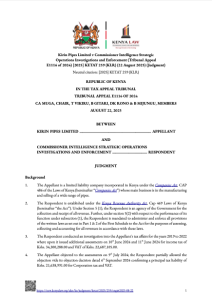The question of whether the Kenya Revenue Authority (KRA) can deem every bank deposit as income and therefore subject it to tax is one that keeps many business owners awake at night. A recent decision in the case of Kirin Pipes Limited vs KRA Commissioner – Intelligence & Strategic Operations (Appeal No. E1116/2024) sheds crucial light on this matter.
This ruling by the Tax Appeals Tribunal (TAT) is a must-read for all Kenyan entrepreneurs and finance professionals.
The Core Issue
At the heart of the dispute was a critical question:
Under what circumstances can KRA treat all deposits into a company’s bank account as taxable income?
What Happened?
KRA investigated Kirin Pipes Limited for the years 2019 – 2022 and raised tax assessments of:
– KES 34,300,288 (Income Tax), and
– KES 22,687,105 (VAT).
KRA’s position was straightforward: every deposit into the company’s bank accounts during this period amounted to income.
But Kirin Pipes Limited disagreed.
The Company’s Argument
Kirin Pipes Limited maintained that not all deposits were taxable income. Their key arguments were:
1. Capital Injection by Shareholders
– The company had an initial share capital of KES 10 million.
– Shareholders later deposited an additional KES 29,425,495.45 to support operations.
– The company insisted these deposits were capital contributions, not income.
2. Loan Facility
– The company obtained a facility of KES 31,697,392 from Nanchang Municipal Engineering Development.
– They argued that this was a loan used to finance initial operations, and should not be taxed as income.
3. Additional Shareholder Support
– Kirin Pipes claimed that it also received KES 24,619,662 from shareholders as operational support.
– Again, they insisted these funds were not taxable income but shareholder deposits.
What the Tribunal Decided
The Tribunal dismissed the company’s appeal, siding with KRA. Here’s why:
1. Lack of Proper Documentation
– Kirin Pipes failed to provide a detailed analysis of deposits linking them to specific shareholders.
– Only uncertified bank statements and SWIFT slips were provided. No board resolutions, minutes, or clear records of capital injection were submitted.
2. No Evidence of Updated Shareholding
– The company presented a CR12 showing initial share capital of KES 10 million, but no evidence of how the alleged capital injections changed the shareholding structure.
3. The “Loan” Was Questionable
– The KES 31.6 million loan agreement lacked interest and a repayment schedule.
– No repayments were made between 2019 and 2024.
– This cast doubt on whether it was truly a loan or disguised income.
In short, the Tribunal held that Kirin Pipes failed to prove that the KES 54,045,101.45 deposits were capital or loan funds. As a result, KRA was justified in treating all deposits as taxable income.
Key Takeaways for Businesses
This case offers important lessons for companies in Kenya:
✅ Keep proper records – Always maintain certified bank statements, shareholder resolutions, and clear documentation for capital injections or loans.
✅ Document shareholder changes – Update CR12 records to reflect new capital contributions.
✅ Formalize loan agreements – Ensure loans have clear repayment terms, interest, and supporting evidence of repayments.
✅ Burden of proof lies with you – If KRA challenges your deposits, it’s up to you to prove they are not income.
Final Word
The Kirin Pipes Limited case is a reminder that in tax matters, documentation is everything. Without clear evidence, KRA can and will treat your bank deposits as taxable income.
For business owners, the lesson is simple: if it’s not well-documented, it might as well be income in the eyes of KRA.









